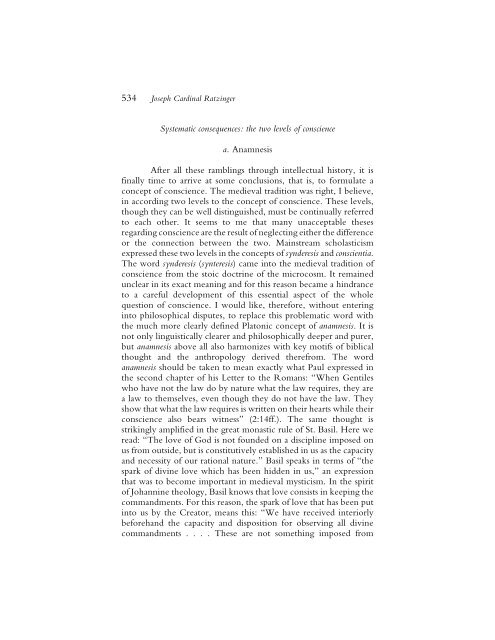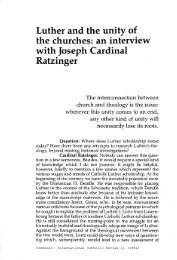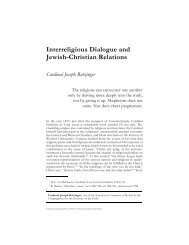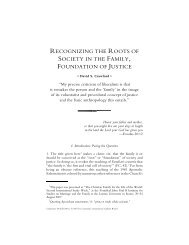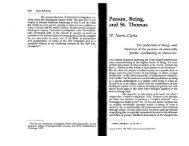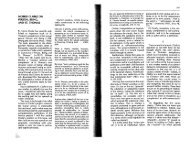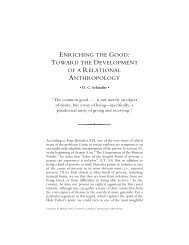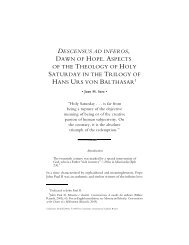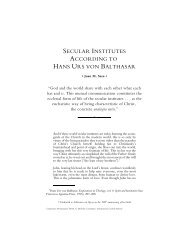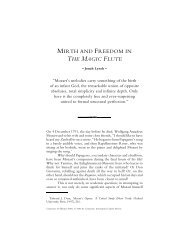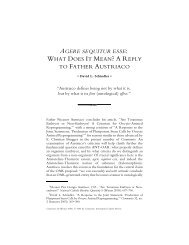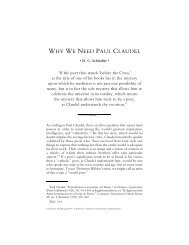Joseph Ratzinger. Conscience and Truth. Communio 37 (2010)
Joseph Ratzinger. Conscience and Truth. Communio 37 (2010)
Joseph Ratzinger. Conscience and Truth. Communio 37 (2010)
Create successful ePaper yourself
Turn your PDF publications into a flip-book with our unique Google optimized e-Paper software.
534 <strong>Joseph</strong> Cardinal <strong>Ratzinger</strong>Systematic consequences: the two levels of consciencea. AnamnesisAfter all these ramblings through intellectual history, it isfinally time to arrive at some conclusions, that is, to formulate aconcept of conscience. The medieval tradition was right, I believe,in according two levels to the concept of conscience. These levels,though they can be well distinguished, must be continually referredto each other. It seems to me that many unacceptable thesesregarding conscience are the result of neglecting either the differenceor the connection between the two. Mainstream scholasticismexpressed these two levels in the concepts of synderesis <strong>and</strong> conscientia.The word synderesis (synteresis) came into the medieval tradition ofconscience from the stoic doctrine of the microcosm. It remainedunclear in its exact meaning <strong>and</strong> for this reason became a hindranceto a careful development of this essential aspect of the wholequestion of conscience. I would like, therefore, without enteringinto philosophical disputes, to replace this problematic word withthe much more clearly defined Platonic concept of anamnesis. It isnot only linguistically clearer <strong>and</strong> philosophically deeper <strong>and</strong> purer,but anamnesis above all also harmonizes with key motifs of biblicalthought <strong>and</strong> the anthropology derived therefrom. The wordanamnesis should be taken to mean exactly what Paul expressed inthe second chapter of his Letter to the Romans: “When Gentileswho have not the law do by nature what the law requires, they area law to themselves, even though they do not have the law. Theyshow that what the law requires is written on their hearts while theirconscience also bears witness” (2:14ff.). The same thought isstrikingly amplified in the great monastic rule of St. Basil. Here weread: “The love of God is not founded on a discipline imposed onus from outside, but is constitutively established in us as the capacity<strong>and</strong> necessity of our rational nature.” Basil speaks in terms of “thespark of divine love which has been hidden in us,” an expressionthat was to become important in medieval mysticism. In the spiritof Johannine theology, Basil knows that love consists in keeping thecomm<strong>and</strong>ments. For this reason, the spark of love that has been putinto us by the Creator, means this: “We have received interiorlybeforeh<strong>and</strong> the capacity <strong>and</strong> disposition for observing all divinecomm<strong>and</strong>ments . . . . These are not something imposed from


